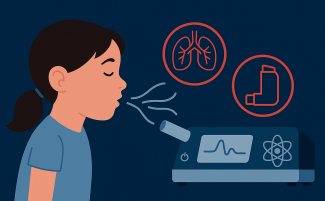JILA and NIST Fellow and University of Colorado Boulder physics professor Jun Ye has been awarded a prestigious 2025 AB Nexus seed grant for his pioneering work in quantum sensing technologies. The grant, part of a $750,000 funding initiative supporting interdisciplinary research between CU Boulder and the CU Anschutz Medical Campus, will help Ye and his collaborators develop a revolutionary breath test to diagnose respiratory illnesses in children.
Partnering with Dr. Lilliam Ambroggio of CU Anschutz, Ye’s team is harnessing the precision of quantum optics and advanced laser systems to analyze molecular signatures in exhaled breath. The goal: to rapidly and non-invasively distinguish between bacterial pneumonia, viral infections, and asthma—conditions that often present similarly but require vastly different treatments.
The project exemplifies the mission of AB Nexus, which was launched in 2020 to foster cross-campus collaborations that tackle complex health challenges. This year’s grant cycle emphasized quantum-enabled health research and support for early-career investigators. Ye’s project was one of two quantum-focused initiatives selected for $300,000 in seed funding.
Ye’s work continues JILA’s tradition of applying fundamental physics to real-world challenges. If successful, the breath test could eventually be adapted into portable devices for clinical use, offering a powerful new tool for pediatric care.



 The Physics Frontiers Centers (PFC) program supports university-based centers and institutes where the collective efforts of a larger group of individuals can enable transformational advances in the most promising research areas. The program is designed to foster major breakthroughs at the intellectual frontiers of physics by providing needed resources such as combinations of talents, skills, disciplines, and/or specialized infrastructure, not usually available to individual investigators or small groups, in an environment in which the collective efforts of the larger group can be shown to be seminal to promoting significant progress in the science and the education of students. PFCs also include creative, substantive activities aimed at enhancing education, broadening participation of traditionally underrepresented groups, and outreach to the scientific community and general public.
The Physics Frontiers Centers (PFC) program supports university-based centers and institutes where the collective efforts of a larger group of individuals can enable transformational advances in the most promising research areas. The program is designed to foster major breakthroughs at the intellectual frontiers of physics by providing needed resources such as combinations of talents, skills, disciplines, and/or specialized infrastructure, not usually available to individual investigators or small groups, in an environment in which the collective efforts of the larger group can be shown to be seminal to promoting significant progress in the science and the education of students. PFCs also include creative, substantive activities aimed at enhancing education, broadening participation of traditionally underrepresented groups, and outreach to the scientific community and general public.